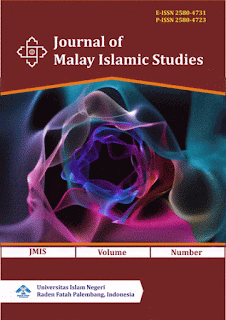LANGUAGE AND POLITICS: CONOTATIVE MEANING ANALYSIS OF “SYAIR PELEMBAGAAN NEGERI BRUNEI” FROM THE PERSPECTIVE OF LEADERSHIP CHARACTERISTIC OF MUDA OMAR ALI SAIFUDDIEN
DOI:
https://doi.org/10.19109/jmis.v2i2.3779Keywords:
MOAS, SPNB, connotative, leader, leadershipAbstract
The creativity of a writer in a literary work mainly involves aspects of language and it is also a platform to widen its political matters. In Brunei Darussalam, Syair Perlembagaan Negeri Brunei (SPNB) (the Brunei State Constitution Syair) by Muda Omar Ali Saifuddien (MOAS) is one of the greatest literary works in the history of the 1959 Constitution. Distinctly, the language used in the couplet poems of SPNB was displayed gracefully with a meaning which the writer intended to convey. Hence, this study aims to explore the semantic aspects of interpreting the meaning of the word that implies both explicit and implicit meanings (connotative). Through literature and analysis methods, this study is also refering to an informant in order to explain the basic meaning of the word. Besides, Teori Segi Tiga Makna Semiotik Charles Sanders Pierce (1931–58) was applied in interpreting implicit meanings. The observed word was derived after identifying six prominent characteristics of leaders and political leadership of MOAS. Those characteristics were selected based on the elaboration by Nik Mustapha Nik Hassan (2013). The study found six political leadership characteristics of MOAS. The characteristics are concern for people’s welfare, prioritization of religious affairs, just and wise, emphasis on knowledge, emphasis on prosperity and security and visionary. In the meantime, at least one conotated word was applied in couplet poetry of SPNB. However, in analyzing the characteristic of a leader who prioritised the religious affairs, it was found that MOAS did not exert a word with explicit meaning. MOAS did also specify the meaning of a conotated word under the category of a just and wise leader. The analysis of the meaning of the word had reflected that MOAS had more than six characteristics that had been discussed as his legacy to stabilise the country, so that the welfare of its people will always be preserved.
References
Bakar, Ramlah Abu. 2005. “Syair Perlembagaan Brunei (Brunei Constitution Poem).”
Fiske, John. 1990. “Ethnosemiotics: Some Personal and Theoretical Reflections.” Cultural Studies 4(1): 85–99.
Hassan, Nik Mustapha Nik. 2013. “Kepimpinan Politik Ikutan.”
Kartono, Kartini. 1985. Beberapa Konsep Dan Teori Mengenai Pemimpin Dan Kepimpinan. Pemimpin Dan Kepimpinan Apakah Pemimpin Abnormal Itu? Jakarta: Rajawali.
Mar’at. 1985. Kepemimpinan Sebagai Suatu Keperibadian Dan Akibatnya. Pemimpin Dan Kepemimpinan. Jakarta: Ghalia Indonesia.
Nomine, Sine. 2007. Julangan Kedaulatan Raja. Bandar Seri Begawan: : Jabatan Percetakan Negara, Jabatan Perdana Menteri.
Nordin, Shah Rul Anuar. 2012. “Emikiran Politik Islam Di Aceh Pada Abad Ke 17 M: Kajian Perbandingan Antara Kitab Taj Al Salatin, Sulalah Al Salatin Dan Bustan Al Salatin.” http://eprints.uthm.edu.my/4655/1/Shah_Rul_Anuar_Bin_Nordin_24pg.pdf.
Peirce, Charles Sanders. 1931. Peirce on Signs: Writings on Semiotic. UNC Press Books.
Rahim, Hj Mohd Yusof Pg Hj Abd. 1995. Adat Istiadat Brunei Darussalam Di Zaman Brunei, Almarhum Sultan Haji Omar Ali Saifuddien Sa’adul Khairi Waddien. Tungku: Akademi Pengajian.
Downloads
Published
Issue
Section
License

Journal of Malay Islamic Studies is licensed under a Creative Commons Attribution-ShareAlike 4.0 International License.


